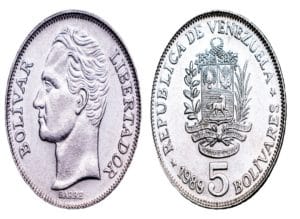To combat out-of-control inflation, the Bank of Venezuela has decided to revamp its currency, the Bolivar, by removing six zeros and creating a new digital state currency. This is the third adaptation of the Bolivar in the last 13 years. In 2008 Chavez and in 2018 Maduro had made changes to the value of the currency by removing three zeros.
The digital Bolivar as a solution to inflation in Venezuela
Evidently, the previous changes have not stopped an inflation that seems to be unstoppable. As well as renewing the nominal value of the currency, this change gives rise to a first digital currency to allow money transfers via a mobile application.
The new digital Bolivar, which came into effect on 1 October, does not change the actual value of the currency. 10 million of the old currency therefore corresponds to the current 10 Bolivars. The new coins will have denominations of 5, 10, 20, 50 and 100 Bolivars. As Nevin Freeman, the CEO of Reserve, an app in the country that allows the transfer of money with fiat currencies and cryptocurrencies, explained to Reuters, this manoeuvre will allow citizens to become aware of the value of the currency.
“At some point, the numbers get so big that they start to feel meaningless,” Freeman said. “The hope is that by removing the zeros, consumers will be able to add up how much a basket of groceries costs in Bolívars again”.
In the past year alone, the Bolivar has reduced in value by 10 times.

A further step towards a state currency
This move by Venezuela’s Central Bank could be a step towards the creation of its own digital state currency, which now looks increasingly likely. Cryptocurrencies, and especially stablecoins, are already widespread in the country. In February, President Maduro declared that the digital Bolívar is one of the primary objectives in his work to digitize the national economy.
In 2018, a sort of digital state currency, the Petro, had also debuted, which was mainly used for cross-border transfers to circumvent the sanctions imposed by the international community on the country.
The experiment, however, was not very successful. Venezuelans prefer to use Bitcoin or stablecoins, which are already accepted as a payment system in many shops. Moreover, digital currencies, especially stablecoins, are considered as one of the best defences against the growing inflation in the country. And it is no coincidence that cryptocurrency adoption is growing in those countries, both South American and African, where inflation rates are in double digits and above.
Even Brazil, Argentina and Colombia are considering CBDCs
It is no coincidence then that many South American states have long been thinking about cryptocurrencies to combat inflation and related problems.
Two days ago, the news emerged that a bill had been presented in Brazil to make Bitcoin legal tender like in El Salvador. A Colombian senator spoke of a similar project in the country, which could also become a hub for miners, considering the possibility of exploiting the energy produced in large quantities by the country’s hydroelectric plants.
In Argentina, President Alberto Fernandez also spoke openly in August about the possibility of expanding the use of cryptocurrencies in the country.
Finally, Uruguay presented a reform bill in August to regulate cryptocurrencies in the country and make them a legal means of payment.
The post Bank of Venezuela gives green light for digital Bolivar appeared first on The Cryptonomist.





















